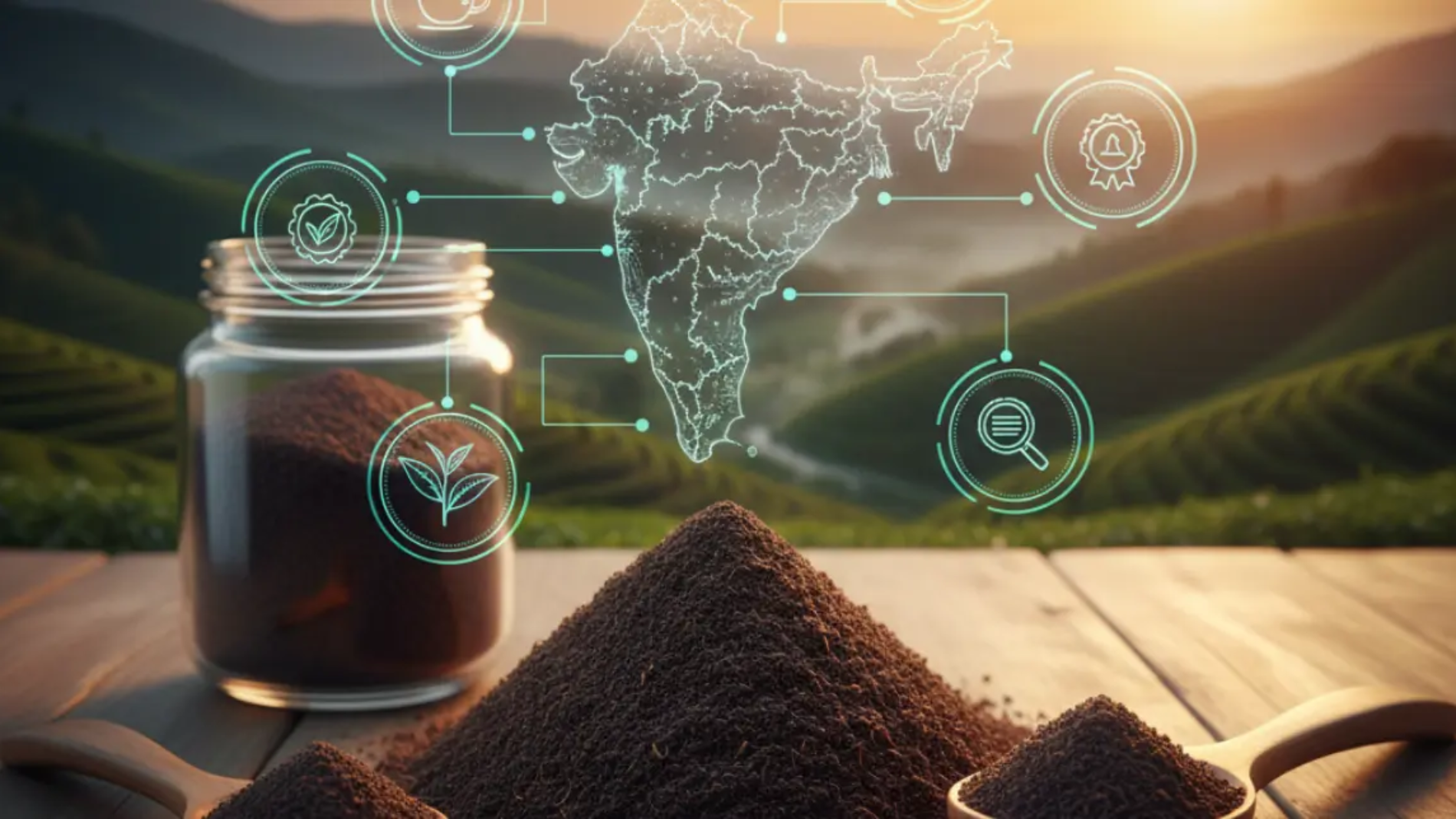When international tea buyers think of India, their minds often jump to two legendary names: the bold, malty power of Assam and the delicate, muscatel “Champagne” of Darjeeling. But nestled in the pristine southern hills lies the third, and perhaps most versatile, star of the Indian tea world: Nilgiri.
Indian Nilgiri Black Tea Powder is a fragrant treasure, prized by discerning blenders and beverage manufacturers for a unique set of characteristics that its northern counterparts cannot match. As an experienced Indian tea exporter with deep roots in the nation’s tea trade, we’ll explore what makes this specific variety a strategic and high-value ingredient for the global market.
The Origin: A Gift from the "Blue Mountains
The story of Nilgiri tea is inseparable from its origin. The name “Nilgiri” literally translates to “Blue Mountains”—a stunning, high-altitude mountain range in the state of Tamil Nadu, South India. This unique terroir is the secret to its special nature.
Unlike the defined seasonal “flushes” of Assam and Darjeeling, the cool, misty, and stable high-altitude climate of the Nilgiris allows for tea to be harvested year-round. This provides a significant advantage for importers and manufacturers: a consistent, reliable, and stable supply chain. The tea bushes, grown at elevations up to 2,500 meters, produce leaves that are bright, clean, and bursting with fragrant oils.
The Signature Profile: Aroma Over Astringency
The primary differentiator for Indian Nilgiri Black Tea Powder is its exceptional flavour profile. While Assam is defined by strength and Darjeeling by delicacy, Nilgiri is defined by its fragrance.
A high-quality Nilgiri brew is incredibly aromatic, with bright floral notes and a crisp, fruity finish. But its most important characteristic for a B2B buyer is its naturally low tannin content.
Tannins are the compounds that cause the bitter, astringent, and “puckering” sensation in many black teas. Because Nilgiri is a low tannin tea, it has a wonderfully smooth, mellow, and “forgiving” taste. It lacks the harsh bitterness that can be a challenge in other teas, making it exceptionally easy to work with in blends and formulations.
Spice Up Your Business with Authentic Indian Flavors
Import and Export Excellence from India!

The "Iced Tea" King: A Critical B2B Application
For the global beverage industry, Nilgiri’s low tannin profile is not just a bonus; it’s a game-changing technical advantage.
Have you ever made a batch of iced tea that turned cloudy, murky, or “creamed down” as it cooled? That cloudiness is caused by the tannins and other compounds binding together at cold temperatures.
Indian Nilgiri Black Tea Powder does not cloud when chilled.
Its low tannin content allows it to remain perfectly clear, bright, and visually appealing, even when ice-cold. This makes it the undisputed #1 choice for beverage manufacturing, especially for:
Ready-to-Drink (RTD) Iced Teas: It provides a crystal-clear base that is visually appealing on a retail shelf.
Iced Tea Concentrates: Used by food service and cafes, it guarantees a clear, consistent product.
Cold Water Soluble (CWS) Powders: It is the ideal raw material for instant tea powders that dissolve easily in cold water.
The Blender's Dream Ingredient
For tea blenders and product developers, Nilgiri’s profile is a versatile canvas. Its subtle, non-overpowering flavour and high aroma make it the perfect base for value-added tea products.
Because it doesn’t have the malty dominance of Assam, it beautifully complements other, more delicate flavours. It is the ideal foundation for creating:
Fruit-Flavored Teas: (e.g., Peach, Lemon, Raspberry)
Floral Blends: (e.g., Rose, Jasmine)
Spiced Teas: Where a lighter, more aromatic base is desired.
Its fragrant lift enhances other ingredients without competing with them, making it a true blender’s dream.
Sourcing Premium Nilgiri Black Tea Powder
When sourcing Indian Nilgiri Black Tea Powder for export, quality is key. As a finest black tea powder supplier, we know that quality is defined by more than just origin.
For a B2B buyer, the powder format offers immense advantages in solubility, consistency, and ease of use over whole leaves. When evaluating a supplier, you must look for:
A Certificate of Analysis (COA): This is your guarantee of quality, verifying specifications like moisture content, particle size (mesh), and microbiological safety.
Vibrant Colour & Aroma: The dry powder should be bright and intensely fragrant. A dull, dusty-smelling powder is a sign of old or low-grade material.
Traceability: A good supplier should be able to provide traceability back to the Nilgiri region, ensuring you are sourcing an authentic product.
While it may be the third of India’s great teas, Nilgiri is second to none in its unique applications. It is a fragrant, versatile, and technically superior ingredient for the modern beverage market.
Spice Up Your Business with Authentic Indian Flavors
Import and Export Excellence from India!

Frequently Asked Questions (FAQs)
1. How does Nilgiri’s flavour differ from Assam and Darjeeling?
Assam is strong, bold, and malty (great with milk). Darjeeling is delicate, floral, and has a “muscatel” (grape-like) note (best on its own). Nilgiri is highly aromatic, fragrant, and fruity, with a smooth, non-bitter finish.
2. What are tannins in tea?
Tannins are a natural group of polyphenols in tea. They are responsible for the astringent, mouth-drying, and sometimes bitter qualities of a brew. They are also the compounds that cause tea to cloud when chilled.
3. Is Nilgiri tea always black tea?
While most famous for its black tea, the Nilgiri region also produces excellent oolong and green teas, which share the same characteristic aromatic and floral notes.
4. Can I use Nilgiri black tea powder for a milk tea or chai?
You can, but it’s not its strength. Its delicate, fragrant notes tend to get lost in milk and heavy spices. A robust Assam CTC tea is the industry standard for a strong milk tea or masala chai.
5. Is Nilgiri tea harvested year-round?
Yes. Unlike the seasonal “flushes” in Darjeeling and Assam, the high-altitude, equatorial climate of the Nilgiris allows for tea to be plucked all 12 months of the year, ensuring a stable and consistent supply.
6. What does “RTD” stand for?
RTD stands for “Ready-to-Drink,” which refers to packaged beverages, like bottled or canned iced teas, that are sold for immediate consumption.
7. Is Nilgiri tea powder the same as instant tea?
High-quality Nilgiri black tea powder is often processed as an “instant tea,” meaning it is fully soluble in hot or cold water. This is what makes it a key ingredient for beverage manufacturing.
8. How do I find a reliable Indian tea supplier for Nilgiri tea?
Look for an experienced Indian tea exporter who understands the nuances of the different tea regions. They should be able to provide samples, a detailed Certificate of Analysis (COA), and clear information on the tea’s grade and intended application.
About us
We bridge the gap between local producers and global markets, ensuring seamless trade facilitation with exceptional quality and reliability. We provide quick delivery services with customized packaging with all approval of International Certificates (Spices board India, MSME, IEC, fssai, FIEO, APEDA, EU certification, FDA and Many More)
Contact us
Shop No. 3, Ganesh Prestige Sr. No. 2/15, Near Laxmi Jewellers, Dhanakawadi, Pune – 411043, Maharashtra INDIA.
Call On
+91 9545205050
+91 9822422584



Leave A Comment